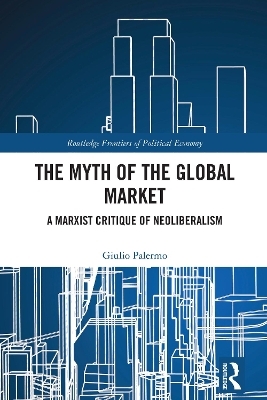
The Myth of the Global Market
A Marxist Critique of Neoliberalism
Seiten
2024
Routledge (Verlag)
978-1-032-72612-0 (ISBN)
Routledge (Verlag)
978-1-032-72612-0 (ISBN)
Capitalism is often held to be the best of all possible worlds, or even the only possible world, in which the market is underpinned by the highest principles of rationality, efficiency, and compatibility with democracy. These truths are backed up by economists. This book questions these “scientific truths”.
Capitalism is often held to be the best of all possible worlds, or even the only possible world, in which the market is underpinned by the highest principles of rationality, efficiency, and compatibility with democracy. These truths are backed up by economists, a group who present themselves as impartial experts capable of operating independently of ideology or political intrusion.
This book questions these “scientific truths”. It discusses the ideological foundations of neoliberalism and the value judgements, often kept implicit, in economic theory. It analyses the claims of the key pillars of neoliberal economics – the neoclassical and Austrian schools of economic thought – and the myths which they propagate about markets. It is shown that there is a deep division between the theoretical market - the fair market, the free market, the market of equal opportunities, the market as producer of wealth, the market as a forum for discovering and sharing information – and the reality. This is not a simple problem of realism. The problem also concerns the perfect market idealized by these theories, which is subjected to criticism through a process of demystification that reveals the true ideological content hidden behind the market myths. There have been various attempts by heterodox schools of economics to move beyond this flawed view of the market. However, these have struggled to gain mainstream attention because of the cultural and political dominance of the neoliberal mindset which is claimed to be objective and neutral. Ultimately, the book argues that neoliberalism needs to be countered with an alternative based on a progressive decommodification of social relations to reduce the real and imagined significance of the market.
This book is essential reading for those interested in Marxist political economy, heterodox economics, and critiques of neoliberalism, capitalism and markets.
Capitalism is often held to be the best of all possible worlds, or even the only possible world, in which the market is underpinned by the highest principles of rationality, efficiency, and compatibility with democracy. These truths are backed up by economists, a group who present themselves as impartial experts capable of operating independently of ideology or political intrusion.
This book questions these “scientific truths”. It discusses the ideological foundations of neoliberalism and the value judgements, often kept implicit, in economic theory. It analyses the claims of the key pillars of neoliberal economics – the neoclassical and Austrian schools of economic thought – and the myths which they propagate about markets. It is shown that there is a deep division between the theoretical market - the fair market, the free market, the market of equal opportunities, the market as producer of wealth, the market as a forum for discovering and sharing information – and the reality. This is not a simple problem of realism. The problem also concerns the perfect market idealized by these theories, which is subjected to criticism through a process of demystification that reveals the true ideological content hidden behind the market myths. There have been various attempts by heterodox schools of economics to move beyond this flawed view of the market. However, these have struggled to gain mainstream attention because of the cultural and political dominance of the neoliberal mindset which is claimed to be objective and neutral. Ultimately, the book argues that neoliberalism needs to be countered with an alternative based on a progressive decommodification of social relations to reduce the real and imagined significance of the market.
This book is essential reading for those interested in Marxist political economy, heterodox economics, and critiques of neoliberalism, capitalism and markets.
Giulio Palermo is a researcher in Political Economy at the University of Brescia (Italy). He was formerly an official at the Italian Ministry of Economy and Finance. His publications deal with Marxism, critique of neoliberalism, relations between economics and ideology, ontology, methodology, and power relations.
INTRODUCTION 1. THE ‘RATIONALITY’ OF THE MARKET 2. MARKET AND DEMOCRACY 3. THE MARKET AND ITS MYTHS 4. THEORETICAL AND REAL MARKETS 5. POST-WALRASIAN ECONOMICS 6. MARKET VALUES 7. WHAT IS TO BE DONE? 8.CONCLUSIONS GLOSSARY Index
| Erscheinungsdatum | 03.10.2024 |
|---|---|
| Reihe/Serie | Routledge Frontiers of Political Economy |
| Verlagsort | London |
| Sprache | englisch |
| Maße | 156 x 234 mm |
| Gewicht | 535 g |
| Themenwelt | Geschichte ► Teilgebiete der Geschichte ► Wirtschaftsgeschichte |
| Geisteswissenschaften ► Philosophie | |
| Sozialwissenschaften ► Politik / Verwaltung ► Politische Systeme | |
| Sozialwissenschaften ► Politik / Verwaltung ► Politische Theorie | |
| Wirtschaft ► Allgemeines / Lexika | |
| Wirtschaft ► Volkswirtschaftslehre ► Wirtschaftspolitik | |
| ISBN-10 | 1-032-72612-1 / 1032726121 |
| ISBN-13 | 978-1-032-72612-0 / 9781032726120 |
| Zustand | Neuware |
| Informationen gemäß Produktsicherheitsverordnung (GPSR) | |
| Haben Sie eine Frage zum Produkt? |
Mehr entdecken
aus dem Bereich
aus dem Bereich
Macht und Herrschaft im Zarenreich
Buch | Hardcover (2024)
C.H.Beck (Verlag)
49,90 €
wie die USA und China um die technologische Vorherrschaft auf der …
Buch | Hardcover (2023)
Rowohlt (Verlag)
30,00 €


